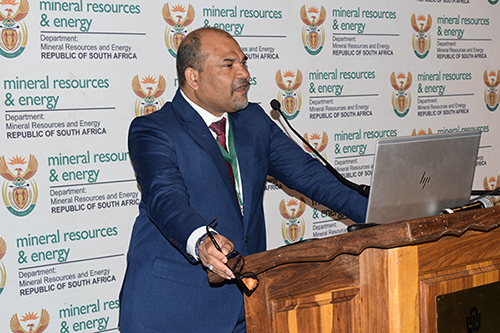Prof Shaukat Abdulrazak, director of the Division for Africa Technical Cooperation at the International Atomic Energy Agency (IAEA), delivered a nuclear lecture at the North-West University’s (NWU’s) Mahikeng Campus on 1 November 2022.
The lecture was organised by the Department of Mineral Resources and Energy’s (DMRE’s) National Liaison Office, in conjunction with the NWU’s Centre for Applied Radiation Science and Technology (CARST).
Prof Abdulrazak is currently on an official visit to South Africa to engage with stakeholders in the IAEA’s Technical Cooperation programme.
His lecture was attended by various NWU officials, different industry stakeholders, university students and mathematics and physical science learners from local schools.
“The learners were specifically invited to learn more about the Technical Cooperation programme, and how they can also benefit from some of the IAEA opportunities,” said Lerato Makgae from the DMRE and a national liaison officer for the IAEA in South Africa.
In his lecture titled “Atoms for peace and development: A vision for nuclear science and technology in Africa”, Prof Abdulrazak said that the IAEA promoted a strong and sustainable global nuclear safety and security framework in its member states.
“We are working to protect people, society and the environment from the harmful effects of ionizing radiation,” he added.
“The IAEA Legislative Assistance programme creates awareness among member states of the international instruments in the nuclear field, assists them to fulfil their international obligations and commitments, and helps them to draft corresponding national nuclear legislation,” said Prof Abdulrazak.
Prof David Modise, executive dean of the NWU’s Faculty of Natural and Agricultural Sciences (FNAS), said the CARST programme is achieving its aim of delivering African graduates in radiation science.
“More than 220 students have graduated from CARST thus far, and most of them have been absorbed by the nuclear industry, including government departments.”
He said the university recognises the importance of CARST in the sector, and that the visit by Prof Abdulrazak is a major milestone. “We also recognise the great role that our industry partners are playing to ensure the success of CARST,” said Prof Modise.
Prof Abdulrazak’s lecture was followed by a panel discussion by industry experts. The panel consisted of Dr Margaret Mkhosi, CEO of the National Radioactive Waste Disposal Institute, Dr Kgomotso Mokoala, a nuclear medicine physician and head of the Clinical Unit at Steve Biko Academic Hospital, Dr Lerato Matsaunyane from the
Agricultural Research Council, and Thabo Tselane from the South African Nuclear Energy Corporation.
Other activities of the day included a launch of the Nuclear Girls and Boys Club, various exhibitions, and a tour of CARST.
About Prof Shaukat Abdulrazak
Prof Abdulrazak facilitates IAEA technical cooperation in 46 countries in Africa across several thematic areas. These include food and agriculture, health and nutrition, industrial application and radiation technology, water and environment, energy planning and nuclear power, nuclear knowledge development and management, and safety.
Before joining the IAEA, he was a CEO at the Kenya National Commission for Science, Technology and Innovation. He is a fellow of The World Academy of Sciences, the African Academy of Sciences, as well as the Japan Society for the Promotion of Sciences. Prof Abdulrazak has published more than 120 papers in international journals, and has presented at various scientific conferences and symposiums.

Prof Shaukat Abdulrazak, director of the Division for Africa Technical Cooperation at the International Atomic Energy Agency, delivers a nuclear lecture at the NWU’s Mahikeng Campus.
